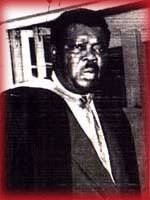

Philip Gbeho was born on Saturday, 14 January 1904, in Vodza, a fishing village in the suburb of Keta in the Volta Region. He attended Keta Roman Catholic Boys School, where he was introduced to the organ, which he learned to play in a short time and even became a pupil organist until he left the school. His father, Doe Gbeho, was a fisherman. His mother, Ametowofa, from the Gadzekpo family, was a trader who was also reputed to have musical talent and was a leader of the female singers in the village drumming and dancing group.
In January 1925 Philip Gbeho gained admission to the newly opened Achimota Teacher Training College in Accra. While studying to become a teacher, he took advantage of the tremendous facilities that the college offered in music to upgrade his own knowledge and practice of music. He was a pianist and violinist, both of which he excelled in because he developed his skills under the tutelage of expatriate teachers in Achimota College who were also very versatile in music. Philip Gbeho’s indefatigable efforts in music in and around Keta caught the attention of the authorities of Achimota College who invited him in 1938, when an assistant music master was needed, to teach music at the college.
Gbeho accepted and began a new career as a music master at Achimota that same year.In 1949, he was offered a one-year scholarship by the British Council to study for the Licentiate diploma at the Trinity College of Music in the United Kingdom.In 1950, Gbeho was granted a Gold Coast government extension scholarship to continue to study at Trinity College of Music for the Graduate of Trinity College (GTCL) degree in music. He continued simultaneously with his lectures, broadcasts and African music performances at various venues in London, including the Artists International Centre in Piccadilly, the West African Students’ Union (WASU) Secretariat, Strawberry Hill College, the Royal Empire Society, the Royal Geographical Society, and Royal Kew Gardens.
On the eve of Ghana’s Independence celebrations, Gbeho won an open competition to write the National Anthem for the newly independent Ghana. His composition remains the national anthem of Ghana until now.Philip Gbeho died on 24 September 1976. He was married with seven children.
Source: Sight on Tour
Leave a Reply